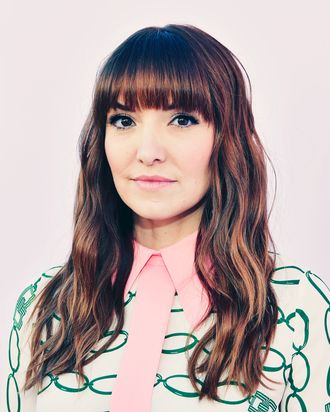
Lorene Scafaria is a name you should start getting used to. The Hustlers writer and director, best known for her beloved adaptation Nick and Norah’s Infinite Playlist, is the latest director to join the small but powerful list of women that dominated film this year.
Adapted from a New York story by Jessica Pressler, Hustlers follows a team of strippers that scam (mostly) wealthy Wall Street men by drugging them and maxing out their credit cards in post–financial crisis Manhattan. “I was interested in finding an organic way to talk about our value system,” Scafaria says, “without some preachy, manufactured story that goes along with it.”
Given its small budget, Hustlers was an unexpected critical and commercial success: It’s being floated as a Best Picture contender, and Scafaria has been plugged as a potential Best Director nominee (although, notably, the recent Golden Globes nominations did not include a single female director). Jennifer Lopez, whose magnetic performance as Ramona drives Hustlers, was nominated for a Golden Globe for Best Supporting Actress.
In person, Scafaria is self-effacing and funny, with traces of a Jersey accent. Earlier this month, we sat down to discuss the struggle of getting “a stripper movie” made, and the cultural significance of a film like Hustlers:
Did you expect Hustlers to be as successful as it has been?
No, because of how hard it was to get the script green-lit. It was hard to bring out a story that’s not black-and-white, that’s not female empowerment wrapped in a bow. Even the love story doesn’t have a happy ending. And the stigma that’s wrapped up with strippers is still there; these characters were judged. I was in rooms with executives who couldn’t say the word stripper without giggling. Women and men. I was getting questions like, “Are they good enough moms?”
Did you have a clear vision for how you wanted to adapt the original story?
No, because it read pretty harsh — on the crimes, obviously. And I think the article presented an unreliable narrator that I was hanging on to while adapting it. And the friendship, the relationship [between Destiny and Ramona] wasn’t even really there in the original story; I guess the women had much more of a business-type relationship.
The Destiny and Ramona love story — some people have read that as romantic love. Was that deliberate on your part?
I like all the interpretations of the relationship between the two of them. It’s genuine love that they have for each other. I certainly think Destiny needs a mother figure in her life, and in a way Ramona feels like that. Destiny’s in such awe of her. That’s what I love about Constance’s face when she sees Jennifer for the first time. I think because [Wu and Lopez] had that dynamic in real life that it extended to the film, and you can feel the romance between them.
You mentioned Hustlers was a way for you to discuss our value system — do you mean the American value system?
I would think the American value system. Men are valued for their money, success, and power, and women are valued for their beauty and their bodies — whether that’s for sex or motherhood. I feel like that has seeped into every corner of our culture and every headline that we’re reading. I don’t love to latch on to modern phrases, but I think toxic masculinity is a phrase worth exploring. I have empathy for everybody who’s trying to navigate that broken value system, men included.
I certainly don’t judge anyone who works in this industry or anyone who takes part in it. The men who walk into the club — I don’t judge them either. But I think there’s something at work there. I mean, it’s a very old profession. It’s a very ancient exchange taking place and it’s interesting to look at the root of that, and then explore it through characters who were actually on the ground and actually doing the work.
The movie portrays strippers in a different light than I’ve ever seen before — I’m thinking of movies like Showgirls or Striptease. Were you deliberately trying to change the pop-culture perception of strippers?
My cinematographer and I spoke a lot about the theme of control that runs through the movie, and applying that to the camera as well as highlighting the athleticism of what they do — the strength and power. We were excited to shoot these women in large format and be able to change the resolutions. I was excited to see this world in a different light, and nonjudgmentally, and leave it up to the audience what to feel.
Have you had feedback from women who work in the industry?
Jacqueline Frances, who goes by Jacq the Stripper, was our comfort consultant and our stripper consultant, and played Jackie in the movie. After we premiered in New York, she brought some women who worked in the industry, and I was very pleasantly surprised, because I can understand that any time you have a movie that’s representative of a community — and a certain community that has been so misrepresented, so misjudged — that it’s tricky. You’ll never get it all right. But it was really wonderful to hear all the positive feedback from them, and from Cardi.
What was Cardi’s reaction?
She said it brought back a lot of memories. I mean, we were certainly trying to make a period piece as well. The movie is definitely about a certain kind of club in a certain time in history.


